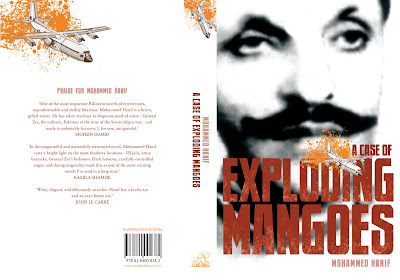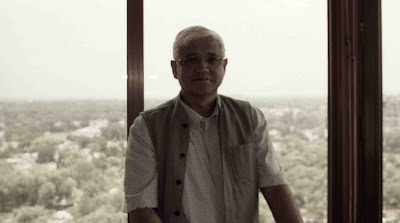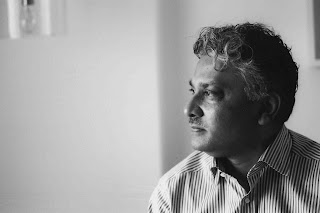
Irreverent, hip, assured. Mohammed Hanif belongs to the new breed of Pakistani writers who herald the birth of a bold, new Pakistan -- only if, inshallah, the army and the mullahs will let it come into being. Hanif, the BBC Urdu Service head who was once a Pilot Officer in the Pakistani Air Force Academy, is the latest entrant in the fast-lengthening list of accomplished young Pakistani writers like Kamila Shamsie, Nadeem Aslam, and Mohsin Hamid, who display consummate skill combined with Sadat Hasan Manto’s hunger to break taboos. Hanif's first book, The Case of Exploding Mangoes, has attracted much attention for its brave, spirited, hilarious look at Pakistan's past. A review in The New York Times even compares it to Joseph Heller's black-humour classic Catch-22. Hemant Sareen, in an email exchange with Hanif, discovers that the suave, cool, wickedly funny voice of the narrator in the book wasn't a put-on act.
Hemant Sareen: How has your book been received in Pakistan?
Mohammed Hanif: Great so far. Brilliant reviews. Wall-to-wall coverage in print and electronic media. And some really sweet emails from random readers.
HS: You must have stumbled upon state secrets to absolve the Bhuttos, the CIA, the Israelis, the Soviets, and the Afghans, not to mention the Indians, all of whom wanted Zia dead?
MH: I didn’t notice that I had absolved anyone. That wasn’t the purpose. I was trying to write a murder mystery with some jokes.
HS: And you have implicated one General (Akhtar, Director ISI) and a Major (Kiyani) from the Army, and the ISI? The book is not just an entertaining historical thriller, it is naming names of real people?
MH: Again, I don’t think I have implicated anyone. You need names for your characters. And Kiyani is a very common last name in Punjab. And as a novelist I think I can name as many names as the plot demands.
HS: You actually suggest that the absolutely powerful, deeply hierarchical, totally unaccountable army-ISI complex was the main culprit.
MH: I do not suggest any such thing. There are some great books out there about the Pakistan army and I think anyone looking for an insight into this complex should read them. My novel will only misguide them.
HS: You were an insider; you were training to be a pilot in the Pakistan Air Force. Did you complete your training? When and why did you quit?
MH: Hardly an insider. I was in my late teens and one of thousands marching up and down the parade squares with an occasional flying lesson. I left because it was quite boring.
HS: What did you learn from that experience? When and how did the experience turn into political convictions, if at all it did?
MH: Sadly, I haven’t been able to turn any of those experiences into any political conviction. I learnt that one should wake up really early, go for long runs, keep one’s belt tight, shine one’s shoes properly, clean my cupboard every week etc. Good lessons all, but I am too lazy to make any use of them in my current life.
HS: You allude repeatedly to the Pakistani army’s self-delusional existence. Does it really believe it is being useful to the country, and that it is popular? One would have imagined over the years it might have been cured of the delusion?
MH: The Pakistan army is not the only army in the world guilty of this delusion. Ask any colonel from the US army or even your Indian army and you’ll find out what they think of civilians like me and you.
HS: Your Zia reads like a Hamlet who comes into knowledge, but late. Was it a literary requirement to humanise the “cruellest of modern tyrants” or do you really think, no harm done, maybe he would have listened to his Koran or the inner voice, and perhaps withdrawn, reformed?
MH: I think you are reading too much into a little plot twist. I don’t think he is redeemed as a character. And as we all know, dictators in our region don’t reform and never withdraw.
HS: Was he, maybe, as much a victim as he was an agency of evil? Was the Islamisation of the army and the society at large that he effected an act of piety and a foreign policy strategy -- and not a tactic to consolidate and retain power?
MH: I don’t think piety had anything to do with it. It was just old fashioned greed for power.
HS: Is there a new clarity in Pakistan about contemporary history? Have people become smart enough to not let another Zia happen?
MH: I hope they have. Millions have marched against Musharraf on the streets of Pakistan during the last one year. And they have forced Musharraf to hold half decent elections, to take off his uniform. I think civil society in Pakistan is definitely on the rise.
HS: Are the Police State elements too deeply entrenched to be uprooted completely?
MH: It’ll be a long struggle.
HS: One of the processes you show in your book is the brutalisation to which the elite of Pakistani society subject their young, hip, secular, modern offspring, which turns them into cynical hate-mongers who abuse religion and power to remain on top of the heap in society.
MH: The elite of Pakistan actually send their offspring to Ivy League colleges, where they get a very expensive education, learn new ways of making money, and make their families proud and richer in the process. Army careers, both in India and Pakistan, are for lower middle classes only, or the academically challenged.
HS: This also suggests that the coups and political upheavals in the country are a way to bring the balance of power back in favour of the elite, who are complicit in their orchestration. Which is why the coups in Pakistan tend to be bloodless -- the feudal elite have only subjects and no competitors?
MS: You are absolutely right but as I said earlier this seems to be changing now. We have a very thriving media, a very determined lawyers’ movement and lots of hardworking rights groups trying to change things.
HS: Is the book a vehicle of your political convictions or are you just trying to be an agent provocateur?
MH: I am a journalist who is dabbling into fiction and hoping to do more of this in future.
HS: What kind of research/investigation did you follow while writing, if you did, or is the book the sum total of impressions and hearsay?
MH: Mostly impressions, recycled rumours. My research involved watching reruns of MASH.
HS: Where were you when you heard about Zia's death? I remember, I was in my late teens and had a personal celebration being in a very apolitical place -- an ashram.
MH: I was also in a very apolitical place, an officers’ mess. We were drinking beer in our rooms. We were shocked and sad so we switched to whisky.
HS: Is Pakistan deciding that the kind of Islam that has gained currency since Zia is not its cup of tea after all? That it’s time to go back to the traditional South Asian Sufi-tinged, gentler, less dogmatic, suppler kind of Islam?
MH: I don’t think anybody is going back to traditional Sufism. There is a very vocal minority that is religious and they are joined by some new converts. Most people are struggling with rising food and fuel prices and really have no time to worry about religion.
HS: Has an increasingly liberal and permissive India (at least in the media and the films) denied Pakistan a familiar model worth emulating -- one that could balance tradition, religion and modernity? The example that comes to the mind is a group of middle-class Pakistani women visiting India, complaining that they find it harder and harder to relate Bollywood because of the western dresses actresses wear in the movies?
MH: Bollywood fashion trends? I think you haven’t been following Bollywood lately. A lot of Pakistani women wear western dresses, you can see them everywhere. Pakistan also has a very vibrant fashion industry. Bollywood is always trying to find new ways of introducing the skimpiest clothes for their women. I don’t think real life women in India and Pakistan have that approach. I was quite surprised about the furore over cheerleaders recently. Obviously people objecting to it have not been to a cinema lately.
HS: You have an MFA from the University of East Anglia. Who was your teacher? Who were your classmates? What makes a young man training to be fighter pilot land in a writing course?
MH: I have been a journalist for a decade and a half, and I wanted some time off to write. That’s how I ended up at UEA. I had some brilliant teachers there. Patricia Duncker, who is the author of Hallucinating Foccoult and many other brilliant novels. Then we had Andrew Cowan and Michel Roberts. Also Richard Holmes taught me a life writing course which was great. Had lots of people in my class: Ann, Vicky, Laura, Emily, Ralph. All great readers and good company at the college bar.
HS: What is your ideal of writing? Who is your favourite author?
MH: I think, trying to find out what you don’t know. You sit with a blank page and you have a very vague idea about what’s going to happen. That really is a delicious feeling when you find out what is going to happen next. My favourite author is Truman Capote. Current favourite author Mirza Athar Baig, who wrote Ghulam Bagh.
HS: A writing school degree on the back cover blurb usually means a serious, literary, personal, well-crafted book. You’ve come out with a lean but breezy historical thriller.
MH: Is that a compliment or a complaint?
HS: The book reads like a movie at times -- the plotting, the pacing, the cuts in and out, the dialogue, and the set pieces (eg Zia’s night out on his bicycle). Are you still into your other passion, cinema?
MH: I have written a movie and a half. Passion is a bit of an overstatement, though. Occasionally I get passionate about theatre. I have written two-and-a-half plays. It’s the best feeling; sitting in the audience, watching people react to your words. I am in the middle of writing a play called The Dictator’s Wife. I’ll be sitting in the audience.
HS: I thought the book, because it machetes away the complexities of the times and around the event, to be guilty of low ambition. Did you ever consider a more monumental, dense, complex, solid book? Or did you plan it that way, but then received a call from Islamabad to knock it off, so settled for a book that moves from one one-liner to the next?
MH: I have written a very monumental, very dense book, and I think the most complex book I have ever written. Sorry you don’t agree. Will try harder next time. I am also glad you recognise that I lack ambition. The only calls I get from Islamabad are from our BBC bureau and trust me they never say, ‘Finish that bloody novel!’
HS: While writing the book, you must have been thinking up Pakistani-flavoured witticisms all the time? You must have been some company to keep in a pub?
MH: Pubs are for writing. Only bores talk in pubs.
HS: What’s your view on how Pakistani writing is coming up and the direction it is taking?
MH: The best Pakistani writing I recently read was a novel called Ghulam Bagh. A philosophical, archaeological thriller. Everybody should read it. I think that’s the direction Pakistani writing should take.
HS: Does being a part of the BBC make you an agent of the West in Pakistan, like it made foreign journalists and their Indian colleagues suspect in Indira Gandhi’s time?
MH: I wasn’t there in Indira’s time. People are generally suspicious of journalists, local or foreign. And I think they should be.
HS: The BBC's maternalism looked a bit out of place in the free-market culture fast becoming the norm in the developing world. Now, what with global warming and food crises, it seems relevant again?
MH: BBC bosses would love this.
HS: Is Pakistani private, independent media an established fact now? Can this advance ever be reversed?
MH: No.
HS: Is there another book on the hard disk?
MH: Only on notebooks.


